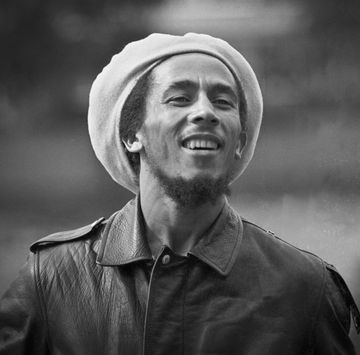(1950-2017)
Who Was Tom Petty?
Rock musician Tom Petty began his career in earnest with a group called Mudcrutch. After he and other members re-formed as Tom Petty and the Heartbreakers, the release of their self-titled 1976 debut started a decades-long and extremely successful run, highlighted by multi-platinum albums that featured the now-classic singles “American Girl,” “Refugee,” “Don’t Come Around Here No More” and “Learning to Fly." In 1989, Petty embarked on an equally successful solo career, delivering memorable music videos to hits like “Free Fallin’” and "Runnin' Down a Dream." Petty also collaborated with other legendary rockers, including Stevie Nicks, Bob Dylan, George Harrison and Johnny Cash, earning three Grammy Awards for his work over the years.
Early Life
Petty was born in Gainesville, Florida, on October 20, 1950, the first son of Earl and Kitty Petty. Though he was close to his mother and younger brother, Petty had a difficult relationship with his father, who was often physically and verbally abusive. But Petty found refuge in music, idolizing the likes of Elvis Presley and the Beatles and learning to play guitar.
By high school, Petty’s passion for music was all-consuming. He began playing bass with a local group called the Epics, and at the age of 17, he dropped out of school to perform with a new band that would become known as Mudcrutch, named after the farm where two of its members lived. Petty quickly emerged as the frontman and primary songwriter in the group, which soon developed a devoted local following.
The year 1974 proved a pivotal one for Petty, who married his girlfriend, Jane Benyo (with whom he already had a daughter, Adria), before moving to Los Angeles with Mudcrutch in the hopes of reaching a wider audience. There, Petty and Benyo had their second daughter, AnnaKim, and Mudcrutch signed to Shelter Records, but when their lone single went largely unnoticed, the group disbanded. However, the label recognized Petty’s talent and offered him a solo contract. Within a few years, their confidence in him would be duly rewarded.
Tom Petty and the Heartbreakers
After trying for a while to put together a new backing band, Petty eventually reconnected with his former Mudcrutch bandmates Mike Campbell (guitar) and Benmont Tench (keyboards), who were playing with bassist Ron Blair and drummer Stan Lynch. Shortly thereafter, they restructured Petty’s deal with Shelter, signed a contract as Tom Petty and the Heartbreakers and set to work on a new record. Released in November 1976, their self-titled debut established the blueprint for success that would follow on much of their subsequent work, combining a hard-edged, rock-and-roll foundation with the pop sensibilities of 1960s groups such as the Beatles and the Byrds, and featuring Petty’s distinctive voice and gift for succinct storytelling.
The album initially sold poorly, until a subsequent tour of England with Nils Lofgren landed it on the British charts. Hoping to capitalize on their newly won overseas popularity, Shelter re-released the single “Breakdown” in the United States, and it reached No. 40 on the charts, giving the group their first taste of success. Incredibly, the single “American Girl,” one of their best-known and best-loved songs, failed to reach the American charts until it was also re-released nearly two decades later.
Undeterred, the group returned to the studio to record their second album, 1978’s You’re Gonna Get It!, which fared far better than its predecessor, reaching No. 23 on the charts and producing the popular singles “Listen to Her Heart” and “I Need to Know.” However, their momentum was momentarily threatened when Shelter was bought by MCA, and Petty’s attempts to renegotiate their contract led to lengthy legal proceedings that left him bankrupt and bitter.
More Hits- "Refugee" and "The Waiting"
Despite this acrimonious start with MCA, the group signed with its subsidiary Backstreet Records and began work on their next album, Damn the Torpedoes. Released in 1979, it rocketed to No. 2 on the charts on its way to selling more than 3 million copies. Packed with quality songs from beginning to end, among its more recognizable tracks were the enduring singles “Don’t Do Me Like That” (No. 10) and “Refugee” (No. 15), which firmly established Tom Petty and the Heartbreakers as rock superstars.
Newly empowered, Petty stood his ground when MCA planned to raise the price of their follow-up for the label from the then-standard $8.98 to $9.98, threatening to either withhold the recordings or title it Eight Ninety-Eight in protest. The label ultimately relented, and Hard Promises was released in 1981. It reached No. 5 on the charts and went platinum, with its lead track, “The Waiting,” giving the group its first No. 1 single.
That same year, Petty collaborated with Stevie Nicks on her album Bella Donna, recording the hit single/duet “Stop Draggin’ My Heart Around,” and also produced Del Shannon’s Drop Down and Get Me. Back in the studio with the Heartbreakers, he continued his successful run with 1982’s Long After Dark, which reached No. 9 on the charts, and the singles “You Got Lucky” and “Deliver Me” hitting No. 20 and No. 21, respectively.
At the same time, the pressures of fame were taking their toll on both Petty’s marriage and his relationship with his bandmates. Shortly after the release of Long After Dark, Ron Blair left the group and was replaced by Howie Epstein. Though some of Petty’s finest hours were still to come, the road there would not always be easy.
New Work and Collaborations
Looking to take their music in a new direction, Tom Petty and the Heartbreakers began work on their new album with producers Dave Stewart (of the Eurythmics), Robbie Robertson (of The Band) and Jimmy Iovine, who had co-produced Damn the Torpedoes with Petty. The sessions also included a wide array of additional musicians and backup singers as the band experimented with different sounds. However, handling such a large group of personalities proved both time-consuming and frustrating, and at one point the tensions grew so great that Petty punched a wall in the studio, breaking his left hand.
At the end of it all came the group’s fifth album, Southern Accents, which reached No. 7 on the charts and featured the singles “Rebels,” “Make It Better (Forget About Me)” and “Don’t Come Around Here No More," which was a neo-psychedelic track co-written by Stewart and inspired by Nicks. It reached No. 13 and was accompanied by a popular Alice in Wonderland–themed video that bolstered the group’s success during MTV’s heyday.
In 1986, Tom Petty and the Heartbreakers embarked on a tour with Bob Dylan—performing both their own material and serving as Dylan’s backup band—before returning to the studio to record Let Me Up (I’ve Had Enough). Though the album reached No. 20 on the charts and produced the single “Jammin’ Me,” which reached No. 1 in the United Kingdom, it was only moderately successful when compared to their earlier accomplishments. However, Petty’s friendship with Dylan would lead to another more successful collaboration when they joined George Harrison, Roy Orbison and Jeff Lynne to form the Traveling Wilburys, whose 1988 self-titled album reached No. 3 on the charts, went triple-platinum and won the Grammy for Best Rock Performance.
"Free Fallin'" and Solo Stardom
In the wake of his success with the Traveling Wilburys, Petty began work on his first solo album, Full Moon Fever, which was produced by Lynne and included several of the Heartbreakers. Released in 1989, the album was a massive success, reaching No. 3 on the charts and going multi-platinum. The album's top single, “Free Fallin’” reached No. 7 on the singles charts and remains among Tom Petty’s best-known songs. “Runnin’ Down a Dream” and “I Won’t Back Down” also performed well.
But despite his new and overwhelming popularity as a solo artist, Petty did not turn his back on his bandmates. In 1990, the Traveling Wilburys released their follow-up album, Volume 3, and in 1991, Tom Petty and the Heartbreakers put out the platinum-selling Into the Great Wide Open, which featured a popular single of the same name accompanied by a music video starring Johnny Depp and Faye Dunaway, as well as the Top 40 offering “Learning to Fly.” Around this time, Petty also revealed that he had secretly brokered a deal with Warner Bros. years earlier and that he would be leaving MCA, bringing an end to years of conflict between him and the label. They would go out with a bang, however, releasing a Greatest Hits album in 1993, which featured the Rick Rubin–produced single “Mary Jane’s Last Dance” and a music video starring Kim Basinger. The album would remain on the Billboard charts for more than six years.
'Wildflowers' and Continued Success
For his first Warner Bros. offering, Petty teamed with Rubin to produce his second solo album, Wildflowers (1994), which nearly equaled the achievements of Full Moon Fever. Among its notable tracks are the singles “You Don’t Know How It Feels,” “You Wreck Me” and “It’s Good to Be King.” Two years later, he reunited with the Heartbreakers (minus Stan Lynch, who left the band in 1994), to record the gold-record soundtrack for the film She’s the One and also to play backup for Johnny Cash on his album Unchained. Also in 1996, Petty and his wife, Jane, divorced after 22 years of marriage, beginning a difficult period for Petty in which he developed a heroin addiction.
Personal struggles aside, Tom Petty and the Heartbreakers kept grinding away, playing 20 sellout nights at the Fillmore in San Francisco in 1997 before returning to the studio with Rubin to produce the Top 10 album Echo (1999). Continuing his record of siding with music fans against the might of the record labels, the single “Free Girl Now” was initially offered as a free MP3 download, and Petty refused to raise ticket prices for their subsequent tour.
Still Runnin’
At the start of the new millennium, Petty got his personal life in order, kicking his heroin addiction and marrying Dana York, whom he had met a decade earlier. In 2002, Tom Petty and the Heartbreakers released their 11th album, The Last DJ, on which Petty aired his ongoing grievances about the record industry. Whatever he thought of it, however, the music industry loved him back, and later that year Tom Petty and the Heartbreakers were inducted into the Rock and Roll Hall of Fame. Amid the accolades, Epstein was fired from the group when his own heroin addiction grew problematic. He died of an overdose the following year, at which point original bassist Ron Blair rejoined the Heartbreakers.
In 2006, Petty went solo once more, working with Lynne to produce the No. 4-charting album Highway Companion, before reuniting with the Heartbreakers for a 30th-anniversary tour. The following year, the group was the focus of a four-hour documentary titled Runnin’ Down a Dream. In 2008, they performed during the halftime show of Super Bowl XLII.
That same year, Petty returned to his roots by re-forming Mudcrutch to record their self-titled debut album, more than 30 years after its original inception. He returned with the Heartbreakers in 2010 for the live studio album MOJO, followed by several years of touring before the band knocked out their 13th album, 2014’s Hypnotic Eye. Amazingly, it was their first album ever to reach No. 1 on the charts.
Death and Legacy
In September 2017, Tom Petty and the Heartbreakers wrapped up a leg of their 40th-anniversary tour with a performance at the Hollywood Bowl. A week later, Petty suffered a cardiac arrest in his Malibu home and was rushed to UCLA Santa Monica Hospital. He died on October 2, 2017, at the age of 66.
Petty's longtime manager, Tony Dimitriades, released a statement on behalf of the family and band: "On behalf of the Tom Petty family, we are devastated to announce the untimely death of our father, husband, brother, leader and friend Tom Petty. He suffered cardiac arrest at his home in Malibu in the early hours of this morning and was taken to UCLA Medical Center but could not be revived. He died peacefully at 8:40 p.m. PST surrounded by his family, bandmates, and friends."
The artist's music was sure to endure, but not without a legal battle: In late December 2017, Wixen Music Publishing, which administers song compositions by Petty and other musicians, filed a lawsuit against streaming giant Spotify, alleging the use of hits like "Free Fallin'" without a license and compensation. Wixen was said to be seeking a damages award of at least $1.6 billion.
On January 19, 2018, the Los Angeles County coroner announced that Petty had died from "multisystem organ failure" caused by a lethal combination of drugs found in his system, including the painkillers fentanyl and oxycodone and the sedative temazepam.
His family followed with a statement on Petty's website, noting that they were aware the musician had been taking medications in order to continue playing live while suffering from a range of ailments that included emphysema, knee problems and a fractured hip.
“Despite this painful injury he insisted on keeping his commitment to his fans and he toured for 53 dates with a fractured hip and, as he did, it worsened to a more serious injury," the statement read. "On a positive note, we now know for certain he went painlessly and beautifully exhausted after doing what he loved the most, for one last time, performing live with his unmatchable rock band for his loyal fans on the biggest tour of his 40-plus-year career. He was extremely proud of that achievement in the days before he passed."
In July 2018, it was announced that a new collection of Petty's works, titled An American Treasure, would be released on September 28. The 60-song box set, curated by Petty's family and band members, reportedly featured of a mix of unreleased tracks, alternate versions, live performances and outtakes, along with home movies and concert footage of the artist.
QUICK FACTS
- Name: Tom Petty
- Birth Year: 1950
- Birth date: October 20, 1950
- Birth State: Florida
- Birth City: Gainesville
- Birth Country: United States
- Gender: Male
- Best Known For: Tom Petty was best known as the legendary frontman of the band Tom Petty and the Heartbreakers. He also enjoyed success as a solo artist with such hit songs as 'Free Fallin'' and 'Runnin' Down a Dream.'
- Industries
- Rock
- Astrological Sign: Libra
- Death Year: 2017
- Death date: October 2, 2017
- Death State: California
- Death City: Los Angeles
- Death Country: United States
Fact Check
We strive for accuracy and fairness.If you see something that doesn't look right,contact us!
CITATION INFORMATION
- Article Title: Tom Petty Biography
- Author: Biography.com Editors
- Website Name: The Biography.com website
- Url: https://www.biography.com/musicians/tom-petty
- Access Date:
- Publisher: A&E; Television Networks
- Last Updated: April 8, 2021
- Original Published Date: April 2, 2014
QUOTES
- If you're phony, they will feel it in the farthest row of the arena.












